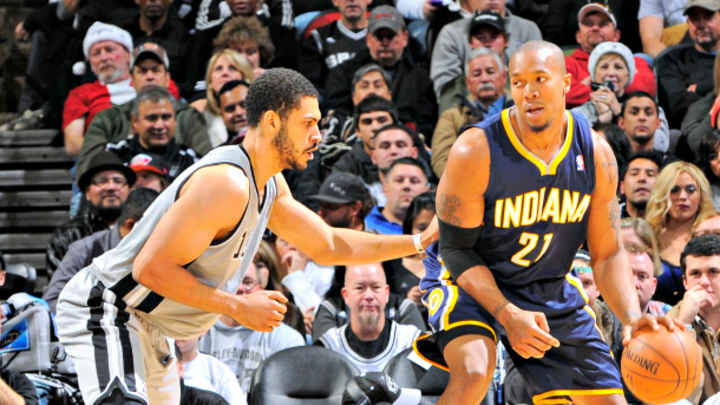Three-pointers: Pacers demolish Spurs with well-aimed, executed attack

David West (right) helped the Pacers completely overpower the Spurs. (D. Clarke Evans/NBAE via Getty Images)
What was intended to be a marquee matchup Saturday night between the top-ranked teams in each conference wound up a cruel demonstration of the Pacers' supremacy. San Antonio was able to work up a 13-point lead through the first 14 minutes of play, but caved soon thereafter. From then on, it was all the Spurs could to do manage to keep the deficit in the high-teens or low-20s, well out of reach, but a margin that saved the embarrassment this game's lopsided nature probably deserved. Even after the Pacers subs let things come unglued a bit in the game's final minutes, Indiana left San Antonio with a 111-100 victory.
• After a second quarter corrective, the Pacers took this game by the throat. Don't let the final margin fool you; if not for a bizarre late-game fold by Indiana's deep reserves, San Antonio would have been buried deep in a 25-point hole, fighting for breath underneath a barrage of open jumpers. Paul George (28 points, 9-14 FG, 4-4 3FG, six assists) was the primary weapon in this case, but he had ample help from a deep cast of contributors. Indiana's power forwards (David West and Luis Scola), in particular, were able to apply pressure to the Spurs defense in all the right places. They finished the night with a combined 32 points on 14-of-21 shooting, a hyper-efficient mark that might actually understate their value. With West and Scola (along with Roy Hibbert) willing to back down opponents, San Antonio's defense was forced to bend over backwards to address the threat with scrambling pressure and frequent double teams. Even the Spurs -- the second-best defensive team in the league by points allowed per possession -- couldn't overcome those compromises, and saw the lead and the game taken away from them in decisive fashion.
After falling behind by eight after the first quarter, Indiana surged through an 84-45 run (per Tim Donahue of Eight Points, Nine Seconds), in which George looked every bit the superstar and the Pacers on the whole played the part of a meticulous offense. That's not always the case for an Indiana team that still fights through regular hiccups in its execution, though this game served to demonstrate how much can be gained from high-level shot making and even a few distinct matchup advantages. Coupled with one of the few defenses that could put the squeeze on the Spurs, that was enough to make an insane push through the bulk of the second, third, and fourth quarters.
• Though one of these teams was clearly not playing its best basketball, their matchup still served up frequent reminder of why Indiana and San Antonio are likely the biggest obstacles to a Miami three-peat. Both came within a single game of upsetting the Heat last postseason for good reason. They have the size necessary to control the rebounding margin, even against a Miami team that's fully engaged. Both are equipped with high-level defenders to throw at LeBron James, along with strong supplementary defenders to assign to Dwyane Wade and Chris Bosh. They have the post play required to work inside-out, providing pressure on the Heat's shorter interior defenders and challenging the integrity of the entire defense. And perhaps most important: both have the ball movement necessary to fully exploit Miami's aggressive help scheme.
Neither the Spurs nor the Pacers are wholly assist-dependent, as they have skilled one-on-one shot creators who can manufacture a quality look if needed. Yet fundamentally, they're at their best when the initial action sets up several more -- a drive or post-up leading to a pass leading to a pass leading to an open jumper. The same could be said of most teams, but what separates these two in particular is that they have players both capable of finishing that sequence with a score and willing to pass the ball along to the open man if not in the best position. Rarely will you find lineups stocked with so many willing passers, all of which have been well-schooled by their top-flight coaches to pick out weaknesses in their specific opponent's coverage. There's no secret weapon to beating the Heat -- merely a commitment to making the right plays against pressure over and over again, as the Spurs and Pacers do more or less every night.
• San Antonio was upstaged completely in this one, though not in a way that would inspire all that much concern about their long-term prospects. For one: Tony Parker (13 points, 6-14 FG, two assists) and Tim Duncan (10 points, 3-10 FG, six rebounds, four assists) missed a mess of makeable shots, including a handful at the rim. Credit the Pacers for crowding and contesting them as few teams can, though it's not often that you'll see both Spurs principals whiffing so frequently on good looks.
Beyond that, Tiago Splitter was barely available for the Spurs in his first game back from a calf injury. Splitter might not seem like a significant loss, but he's an incredibly valuable defender in general and crucial for San Antonio to manage this particular opponent. It was Splitter's absence that allowed David West to take advantage of Boris Diaw, Matt Bonner and Jeff Ayres, a trio of defenders that could neither contain West's post work one-on-one nor recover in time to his pick-and-pop jumpers. It's telling that Splitter's removal from the game essentially coincided with the Spurs' collapse. His absence doesn't wholly account for the demise of San Antonio's offense, but it allowed for a situational weakness to splinter the Spurs' team defense.

Rob Mahoney is an NBA writer dedicated to the minutiae of the game of basketball, its overarching themes and everything in between. He joined the Sports Illustrated staff in 2012.